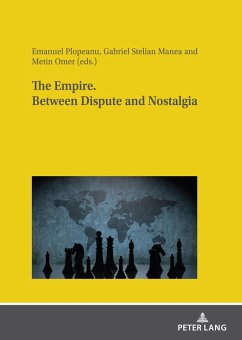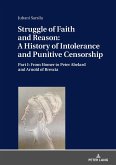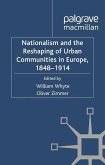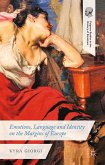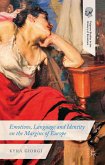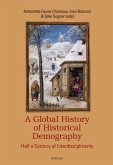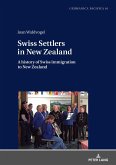The Empire. Between dispute and nostalgia
Herausgegeben:Plopeanu, Emanuel; Manea, Gabriel Stelian; Omer, Metin
The Empire. Between dispute and nostalgia
Herausgegeben:Plopeanu, Emanuel; Manea, Gabriel Stelian; Omer, Metin
- Gebundenes Buch
- Merkliste
- Auf die Merkliste
- Bewerten Bewerten
- Teilen
- Produkt teilen
- Produkterinnerung
- Produkterinnerung
The book examines how different imperial models of diplomacy, administration, economics, and cultural and religious policies were challenged or, on the contrary, defended during and after the collapse of the Empires that promoted them. It provides an overview from multiple perspectives of the imperial phenomenon in all its dimensions, and the studies published in this volume address broad chronological segments and geographical areas relevant to the imperial idea.
Andere Kunden interessierten sich auch für
![Struggle of Faith and Reason: A History of Intolerance and Punitive Censorship Struggle of Faith and Reason: A History of Intolerance and Punitive Censorship]() Juhani SarsilaStruggle of Faith and Reason: A History of Intolerance and Punitive Censorship118,90 €
Juhani SarsilaStruggle of Faith and Reason: A History of Intolerance and Punitive Censorship118,90 €![Interactions Between Rivals: The Christian Mission and Buddhist Sects in Japan (c.1549-c.1647) Interactions Between Rivals: The Christian Mission and Buddhist Sects in Japan (c.1549-c.1647)]() Alexandra CurveloInteractions Between Rivals: The Christian Mission and Buddhist Sects in Japan (c.1549-c.1647)97,20 €
Alexandra CurveloInteractions Between Rivals: The Christian Mission and Buddhist Sects in Japan (c.1549-c.1647)97,20 €![Nationalism and the Reshaping of Urban Communities in Europe, 1848-1914 Nationalism and the Reshaping of Urban Communities in Europe, 1848-1914]() Nationalism and the Reshaping of Urban Communities in Europe, 1848-191437,99 €
Nationalism and the Reshaping of Urban Communities in Europe, 1848-191437,99 €![Emotions, Language and Identity on the Margins of Europe Emotions, Language and Identity on the Margins of Europe]() K. GiorgiEmotions, Language and Identity on the Margins of Europe37,99 €
K. GiorgiEmotions, Language and Identity on the Margins of Europe37,99 €![Emotions, Language and Identity on the Margins of Europe Emotions, Language and Identity on the Margins of Europe]() K. GiorgiEmotions, Language and Identity on the Margins of Europe37,99 €
K. GiorgiEmotions, Language and Identity on the Margins of Europe37,99 €![A Global History of Historical Demography A Global History of Historical Demography]() A Global History of Historical Demography132,85 €
A Global History of Historical Demography132,85 €![Swiss Settlers in New Zealand Swiss Settlers in New Zealand]() Joan WaldvogelSwiss Settlers in New Zealand95,30 €
Joan WaldvogelSwiss Settlers in New Zealand95,30 €-
-
-
The book examines how different imperial models of diplomacy, administration, economics, and cultural and religious policies were challenged or, on the contrary, defended during and after the collapse of the Empires that promoted them. It provides an overview from multiple perspectives of the imperial phenomenon in all its dimensions, and the studies published in this volume address broad chronological segments and geographical areas relevant to the imperial idea.
Produktdetails
- Produktdetails
- Verlag: Peter Lang
- Artikelnr. des Verlages: 284088
- Seitenzahl: 280
- Erscheinungstermin: 5. März 2021
- Englisch
- Abmessung: 216mm x 153mm x 20mm
- Gewicht: 433g
- ISBN-13: 9783631840887
- ISBN-10: 3631840888
- Artikelnr.: 61273208
- Verlag: Peter Lang
- Artikelnr. des Verlages: 284088
- Seitenzahl: 280
- Erscheinungstermin: 5. März 2021
- Englisch
- Abmessung: 216mm x 153mm x 20mm
- Gewicht: 433g
- ISBN-13: 9783631840887
- ISBN-10: 3631840888
- Artikelnr.: 61273208
Emanuel Plopeanu is an associate professor, PhD, at the "Ovidius" University of Constant,a, Faculty of History and Political Science. His areas of interest include United States policy towards the South-East Europe in the 20th century and Romanian-Turkish relations in the 20th century. Gabriel Stelian Manea is a lecturer, PhD, at the "Ovidius" University of Constant,a, Faculty of History and Political Science. His areas of interest include the relationship between the church and communist regimes, spiritual and cultural anti-communist dissent, and the history of the Romanian Orthodox Church during the communist period. Metin Omer is a researcher at the Institute of Science, Culture and Spirituality at "Ovidius" University of Constant,a, Romania. His current areas of research include the historical evolution of Turkish and Tatar communities from Romania, especially after the fall of the Ottoman Empire, and Romanian-Turkish relations.
Introduction
Ubique Victor. Triumphus, Christianity and the Ritualization of ImperialContinuity
The "Clash" of Empires: The Habsburgs, the Ottomans, Safavid Persia and the Anti-Ottoman Projects in a Diplomatic Episode of 1547
Beyond the Ottoman Empire - Past's Hegemonies and Rising Powers; Venice and Habsburgs in the 16th Century
The Empire That Never Was: Ali Kemal's Fetret (Interregnum) and the Vision of a Westernised Ottoman Empire
Foreigners and Foreign Menace (as Perceived) in Romanian Society During First World War. A Few Considerations
"My Dear Cousin": The Diplomacy of the Romanian Royal House at the Imperial Courts in the Eve of World War One
Imperial Nostalgia and Contestation: N. Iorga and the Paradoxes of a Romanian Nationalist
A Book as Wedding Gift: Nicolae Iorga, the 1921 Romanian-Greek Royal Weddings, and the Paths of Knowledge Exchange
Spain after the Empire. Between Nostalgia and the Future
Erroneous Calculations on the Ruins of Empires: The Failure of the Proportional Representation Method in Central and Southern Europe in the 1920s
Borderland's Country: South Dobruja. Imperial Nostalgias on the Edge of the National Ideal (1913-1940)
From Allies to the Undesirable: The Refuge of the Crimean Tatars to Romania During World War Two
The End of a Communist Imperial Illusion. The First Visit of Pope John Paul II in Poland. 1979
The Ghost of Imperialism. The Anti-Western Propaganda in the Last Years of Ceau escu's Regime
Withdrawal of the Soviet Empire: System Crisis or International Crisis?
Communist/Post-Communist Official Remembrance of the Local Involvement in the Holocaust: A Comparison Between Poland and Romania
Ubique Victor. Triumphus, Christianity and the Ritualization of ImperialContinuity
The "Clash" of Empires: The Habsburgs, the Ottomans, Safavid Persia and the Anti-Ottoman Projects in a Diplomatic Episode of 1547
Beyond the Ottoman Empire - Past's Hegemonies and Rising Powers; Venice and Habsburgs in the 16th Century
The Empire That Never Was: Ali Kemal's Fetret (Interregnum) and the Vision of a Westernised Ottoman Empire
Foreigners and Foreign Menace (as Perceived) in Romanian Society During First World War. A Few Considerations
"My Dear Cousin": The Diplomacy of the Romanian Royal House at the Imperial Courts in the Eve of World War One
Imperial Nostalgia and Contestation: N. Iorga and the Paradoxes of a Romanian Nationalist
A Book as Wedding Gift: Nicolae Iorga, the 1921 Romanian-Greek Royal Weddings, and the Paths of Knowledge Exchange
Spain after the Empire. Between Nostalgia and the Future
Erroneous Calculations on the Ruins of Empires: The Failure of the Proportional Representation Method in Central and Southern Europe in the 1920s
Borderland's Country: South Dobruja. Imperial Nostalgias on the Edge of the National Ideal (1913-1940)
From Allies to the Undesirable: The Refuge of the Crimean Tatars to Romania During World War Two
The End of a Communist Imperial Illusion. The First Visit of Pope John Paul II in Poland. 1979
The Ghost of Imperialism. The Anti-Western Propaganda in the Last Years of Ceau escu's Regime
Withdrawal of the Soviet Empire: System Crisis or International Crisis?
Communist/Post-Communist Official Remembrance of the Local Involvement in the Holocaust: A Comparison Between Poland and Romania
Introduction
Ubique Victor. Triumphus, Christianity and the Ritualization of ImperialContinuity
The "Clash" of Empires: The Habsburgs, the Ottomans, Safavid Persia and the Anti-Ottoman Projects in a Diplomatic Episode of 1547
Beyond the Ottoman Empire - Past's Hegemonies and Rising Powers; Venice and Habsburgs in the 16th Century
The Empire That Never Was: Ali Kemal's Fetret (Interregnum) and the Vision of a Westernised Ottoman Empire
Foreigners and Foreign Menace (as Perceived) in Romanian Society During First World War. A Few Considerations
"My Dear Cousin": The Diplomacy of the Romanian Royal House at the Imperial Courts in the Eve of World War One
Imperial Nostalgia and Contestation: N. Iorga and the Paradoxes of a Romanian Nationalist
A Book as Wedding Gift: Nicolae Iorga, the 1921 Romanian-Greek Royal Weddings, and the Paths of Knowledge Exchange
Spain after the Empire. Between Nostalgia and the Future
Erroneous Calculations on the Ruins of Empires: The Failure of the Proportional Representation Method in Central and Southern Europe in the 1920s
Borderland's Country: South Dobruja. Imperial Nostalgias on the Edge of the National Ideal (1913-1940)
From Allies to the Undesirable: The Refuge of the Crimean Tatars to Romania During World War Two
The End of a Communist Imperial Illusion. The First Visit of Pope John Paul II in Poland. 1979
The Ghost of Imperialism. The Anti-Western Propaganda in the Last Years of Ceau escu's Regime
Withdrawal of the Soviet Empire: System Crisis or International Crisis?
Communist/Post-Communist Official Remembrance of the Local Involvement in the Holocaust: A Comparison Between Poland and Romania
Ubique Victor. Triumphus, Christianity and the Ritualization of ImperialContinuity
The "Clash" of Empires: The Habsburgs, the Ottomans, Safavid Persia and the Anti-Ottoman Projects in a Diplomatic Episode of 1547
Beyond the Ottoman Empire - Past's Hegemonies and Rising Powers; Venice and Habsburgs in the 16th Century
The Empire That Never Was: Ali Kemal's Fetret (Interregnum) and the Vision of a Westernised Ottoman Empire
Foreigners and Foreign Menace (as Perceived) in Romanian Society During First World War. A Few Considerations
"My Dear Cousin": The Diplomacy of the Romanian Royal House at the Imperial Courts in the Eve of World War One
Imperial Nostalgia and Contestation: N. Iorga and the Paradoxes of a Romanian Nationalist
A Book as Wedding Gift: Nicolae Iorga, the 1921 Romanian-Greek Royal Weddings, and the Paths of Knowledge Exchange
Spain after the Empire. Between Nostalgia and the Future
Erroneous Calculations on the Ruins of Empires: The Failure of the Proportional Representation Method in Central and Southern Europe in the 1920s
Borderland's Country: South Dobruja. Imperial Nostalgias on the Edge of the National Ideal (1913-1940)
From Allies to the Undesirable: The Refuge of the Crimean Tatars to Romania During World War Two
The End of a Communist Imperial Illusion. The First Visit of Pope John Paul II in Poland. 1979
The Ghost of Imperialism. The Anti-Western Propaganda in the Last Years of Ceau escu's Regime
Withdrawal of the Soviet Empire: System Crisis or International Crisis?
Communist/Post-Communist Official Remembrance of the Local Involvement in the Holocaust: A Comparison Between Poland and Romania

